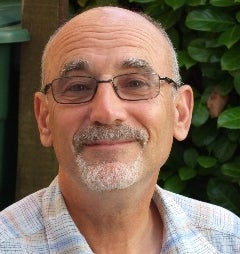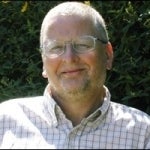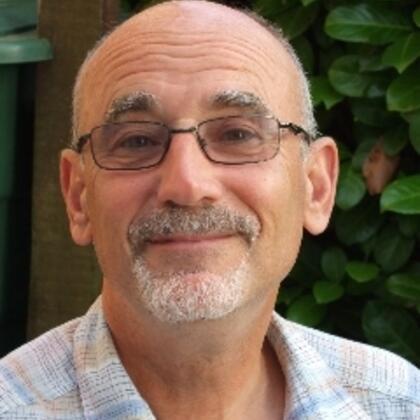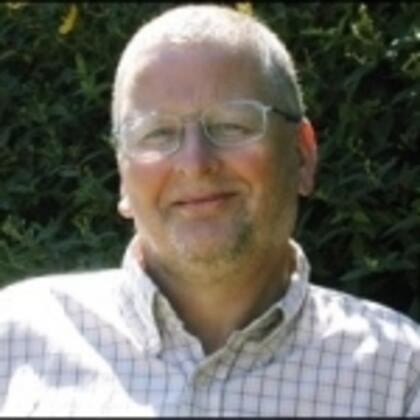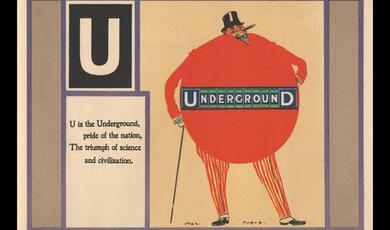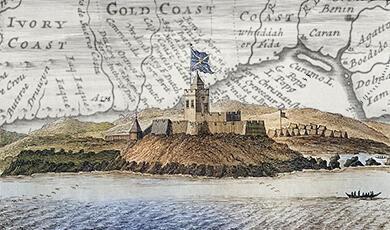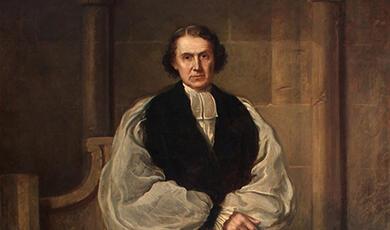The Life and Times of Wilfred Owen
Share
- Details
- Text
- Audio
- Downloads
- Extra Reading
The Great War' shaped the 20th century, led directly to the Second World War, and continues to fascinate and intrigue successive generations. But why did so much poetry derive from it, unlike successive conflicts?
This talk, aimed at sixth-form students of English literature, as well as the general public, addresses this question. It focuses on major writers such as Owen, Sassoon and Brookes alongside less well-known but significant figures such as Ivor Gurney, Charles Sorley and Hulian Grenfell, placing them in their social, economic and historical contexts.
Download Text
THE LIFE AND TIMES OF WILFRED OWEN
Peter Bunyan and Chris Cuff
The First World War continues to fascinate and intrigue each new generation: its origins, its conduct and progress, and its effect on the course of the 20th century and beyond. This year alone, now 89 years after the conflict started, BBC 2 and Channels 4 and 5 have shown major historical series on the war, documentaries on the Dardanelles campaign of 1915 and the discovery and excavation of a trench system near Ieper (Ypres) in Belgium have been broadcast, the Imperial War Museum has mounted a major and unique exhibition of War Poets which closed this April, while Dominic Hibberd’s, probably, definitive biography of Wilfred Owen has been recently published. And countless scholarly analyses, covering military, literary, social and cultural aspects of the war are published each and every month. ‘Private Peaceful’, the latest novel by the eminent children’s author and ‘laureate’, Michael Morpurgo, is set in the Great War and deals with the issue of executions, itself a topic which divides historians and politicians – witness the campaign (unsuccessful) by MP Andrew McKinley to have those servicemen who were executed pardoned. This year, also, the oldest surviving veteran of the Great War died, aged 108: Jack Davis, born in Kentish Town, north London and serving in the Duke of Cornwall Light Infantry.Which leads us to consider how the war is to be remembered in years to come. Veterans no longer re-visit the battle sites to remember and pay homage: students, tourists and some dedicated researchers and ‘enthusiasts’ are to be found there, in the main. The way forward seems to lie in the ‘Visitor Centre’ concept, as seen at Newfoundland Park and, soon, on the Somme, next to the Thiepval Memorial to the missing.
And, of course, perceptions of the war, about its significance, have changed over time. In a recent volume on how historians have apportioned ‘blame’ for the war, Annika Mombauer (2002) shows how, in the 1920s, Germany largely bore the brunt of blame for causing the war, for opinion to be ‘revised’ in the 1930’s towards ‘shared responsibility’ with the Entente powers, to be ‘anti-revisioned’ towards Germany again in the 1960s through the work of German historian Fritz Fischer, to the discomfort of the new ‘West Germany’ and the delight of the new ‘GDR’! Immediately after 1918, it was ‘celebrated’ for a few years, until 1925, with official parties and fancy-dress balls, notably on the evening before Remembrance Day: Britain was, after all, ‘dance mad’ in the 20’s. ‘Celebration’, however, quickly gave way to ‘commemoration’, to the disapproval of Lord Curzon who, with other Conservatives, did not want the war to be viewed as an arena of ‘unspeakable agony’, but as a great Imperial victory. Maybe he just enjoyed a good party at the Ritz on November 10!. Winston Churchill didn’t get his way over Ypres: to leave it as a ruin. The local inhabitants came back and demanded it was re-built. A temporary, wood and plaster ‘Cenotaph’ in Whitehall, designed by Sir Edward Lutyens, proved so popular that a permanent stone one was erected. The Commonwealth War Graves Commission collected as many bodies and body parts as possible and developed cemeteries into the ‘English gardens’ we know and love today, and the great commemorative monuments to the ‘missing’ were built: the Thiepval Memorial on the Somme and the Menin Gate memorial at Ypres, the former only just being completed as Hitler became Chancellor in 1933. Siegfried Sassoon did not approve: his poem of 1927, ‘On Passing Through the New Menin Gate’, declares:
‘Here was the world’s worst wound. And here with pride,
‘Their name liveth forever’ the Gateway claims…
Well might the Dead who struggled in the slime
Rise and deride this Sepulchre of crime.’
The Imperial War Museum was proposed as early as 1917 as a memorial to the dead, to be built on an 11 acre site in Hyde Park. This was scaled-down due to post-war austerity and finally ended up in its present home, the old ‘Bedlam’ insane asylum in Lambeth. But throughout the country thousands of small, modest memorials were erected, in the form of stone crosses, inscribed with names of the dead, or Memorial parks and tree-lined avenues of remembrance were dedicated. I note that the War Memorial in my own high street has flowers laid next to it by the family and friends of people who have recently died – a kind of natural colonisation… Robert Jones, a prominent surgeon, at the time, felt that the best memorial to the war dead would be a stronger commitment to social welfare: ‘Are our memorials to be spiritual or material, living and permanent, or dead and cold…marble or brass has no re-echoing voice in me…the heroic spirit that sent our beloved dead to their end should be reflected in an equally heroic effort…to make and keep the nation efficient.’ Note the word ‘efficient’! There was a vociferous ‘hospitals and scholarships’ movement, as well as the more conventional ‘marble and brass’ one as a way of ‘remembering’, dividing along political lines. The ‘two minutes silence’ on November 11 was adopted in 1919, intended not only to honour the dead but also to unite a country caught up in post-war political and economic turmoil. The historian George Robb (2002) quotes an editorial in the Daily Express of that year: ‘It is our duty to see that they did not die in vain, and for the accomplishment of that duty all classes must combine as they did to win the war, unselfishly and harmoniously. There must be a truce in domestic quarrels, and an end to industrial strife. We must all pull together lest the rewards of victory be thrown away.’
Poppies became the most common emblem of remembrance, inspired by John McCrae’s popular poem ’In Flanders’ Fields’:
In Flanders’ fields the poppies blow
Between the crosses, row on row,
That mark our place, and in the sky
The larks, still bravely singing, fly
Unheard amid the guns below…’
By the 1930s over 20 million were being sold each year, raising over half a million pounds for the British Legion appeal. During the 1960s I found myself being one of that, albeit, minority who couldn’t bring himself to wear a poppy, not a red one at least, as I felt too strongly that the form of remembrance glorified war and negated the ‘experience’ of the servicemen, as I perceived it in the ‘literature of disillusionment’, then becoming more popular and being taken up in schools and universities, notably C. Day Lewis’s new edition of Owen’s collected poems (1963) and, later, George Coppard’s ‘With a Machine Gun To Cambrai’ and Eric Hiscock’s ‘The Bells of Hell Go Ting-A-Ling-A-Ling’.
And then there were the many ‘literary’ memorials, which began to appear some ten years or so after the end of the war, in the form of memoirs and novels. We think of Sassoon’s ‘Trilogy’, in particular ‘Memoirs of an Infantry Officer’ (1930), Robert Graves’s ‘Goodbye to All That’ (1929) which he began as a novel, Edmund Blunden’s ‘Undertones of War’ (1928), Frederick Manning’s novel ‘Her Privates We’ which had to be published in an expurgated edition in 1930 because of its course (that is, ‘realistic’) dialogue (we had to wait until 1960, of course, to see the ‘f’ or ‘c’ words in print!), and whose collective experiences, together with many others, have been subsequently re-worked into the fictional writings of authors such as Susan Hill (‘Strange Meeting’ - 1982), Pat Barker (‘Regeneration’-1991) and Sebastian Faulks (‘Birdsong’-1993). As an aside, it is interesting that this kind of writing didn’t follow on from the 2nd World War, although the definitive novel about that conflict did appear some ten years after it, but took an allegorical form: I refer to William Golding’s ‘Lord of the Flies’ (1955).
How the war started is a complex issue, still mired in controversy (there are plenty of books published on just that one issue!). But we now see the assassination of the Archduke Franz Ferdinand and his wife in Sarajevo on June 28 1914 as the ‘spark’ which caused the blaze: leading to the ‘July crisis’; an affront to Austro-Hungarian national pride, leading to Vienna seeking support from Berlin should war be declared on Serbia as ‘punishment’; the new (ish!) state of Germany fearing the threat of mobilisation from Russia and its ‘partner’ France should it support the Hapsburg attempt to solve the ‘Balkan problem’ and shore up its ailing empire and, thus, leading to Germany’s employment of its ‘Schlieffen’ plan: a pre-emptive attack on France first, through the Ardennes and Belgium, in a massive push before Russia, with its supposedly less efficient transport infrastructure, could mobilize its potentially massive armies and, with France out of the war, concentrate forces on the Russian front. All this to be accomplished in about 40 days, according to Schlieffen, to stand any chance of success! This as the military solution to Germany’s ‘problem’ should diplomacy fail. And at the heart of diplomacy was the carving out of a German ‘empire’, so that she could take her place in the world as a proud, important ‘Imperial’ European nation, on a par with Britain, France and, to an extent, Russia.
And so the war ‘broke out’ on 4 August 1914. Britain’s role is intriguing and controversial: some historians hold Britain rather more responsible, indirectly, than we would sometimes think. After the war Germany argued that support for Austria-Hungary would not have been so manifest and France would not have been attacked if Britain had made it palpably clear from the outset that she would support France and Russia against Germany in the event of war. But Britain’s interests lay elsewhere, in the Empire.
The war put great pressure on the Empire and its peoples, but it also created tremendous opportunities. Nationalist leaders in many colonised countries saw supporting Britain in the war as a way of wringing concessions when the conflict was over. The professional soldier Julian Grenfell wrote: ‘don’t you think it [the War] has been a wonderful, and almost incredible, rally to the Empire; with Redmond and the Hindus and Will Crooks and the Boers and the South Fiji Islanders all aching to come and throw stones at the Germans.’ And H.G. Wells’ fictional hero Mr. Britling could say, when war broke out, ‘Now everything becomes fluid. We can re-draw the map of the world.’ Mr Britling Sees It Through (1917). ‘Die-hard Imperialists’ such as Lord Curzon (1915), Lord Milner (1916) and Jan Smuts (1917) were drawn into the wartime government and hoped, no doubt, to do just that, with the prospect of the German and Ottoman (Turkish) colonies available to the victors.
And it’s in Grenfell’s poem ‘Into Battle’, published in ‘The Times’ in early 1915, that we see at least one view of how war and the purpose of war was perceived at the time, as a result of nearly 100 years of an increasingly literate general public being largely untouched by the realities of war and being conditioned by a literature which romanticised death in battle (cf. Tennyson’s ‘Charge of the Light Brigade’). Grenfell’s poem is a very good one. It’s not a Christian poem, nor even specifically English: a German, Austrian or Russian soldier, admittedly of a certain education and background, could have written it. One literary critic, John Lehmann (1984) has written, ‘It is scarcely possible not to see in (‘Into Battle’) a symbolic and no doubt unconscious transposition of the orgasm of love.’ (No doubt Chris will allude to the homoerotic world which many of the War Poets inhabited or had experience of: Rupert Brooke particularly springs to mind). But see what you think.
(Into Battle)
Grenfell was of aristocratic family, joining a cavalry regiment on leaving Oxford in 1910 and being posted to South Africa: how significant for the times we are talking about that the Colonel-in-Chief of his regiment, the Royal Dragoons, was the crown-prince of the German state! Interesting again that, unlike the great majority of other poems written earlier and later in the war, ‘Into Battle’ does not extol patriotism and the need to defend the sacred shores of ‘England’ against a ruthless enemy, nor is it an expression of the horror and futility of modern warfare: it is simply a hymn to the splendour of fighting and the fighting man’s destiny, almost mystic, and fatalistic, in its implication. Grenfell loved sport, especially riding, cricket and boxing, but was highly critical of the upper-class mores and social conventions of his time, and directly of his own mother and her circle of friends and admirers, and wrote a collection of critical and subversive essays, of a sociological and philosophical nature – a kind of early ‘Marxist critical theory’ without ever having read or heard of Marx- while at Oxford, which was derided and suppressed. He also had artistic and ‘bohemian’ tendencies which no doubt would have flowered and been fulfilled had he not been killed in 1915, as later was his brother Billy. I detect echoes of Grenfell’s ‘existential’ tone in the early nature poems of Ted Hughes nearly 50 years later, in ‘Hawk Roosting’ for example. Grenfell, then, is one of that ‘lost generation’, not that a whole generation was lost, but one of those born into the upper and upper-middle classes who might have ‘made a difference’ as the 20th century unfolded.
But if we are looking at the ‘times’ in which Wilfred Owen lived, why not consider another, now classic, poetical representation, that of Philip Larkin’s ‘MCMX1V’, published in 1964 in his ‘Whitsun Weddings’ collection.
(MCMXIV)
As a young man in the early 60s these images certainly reflect how I came to view that time when the ‘lights were going out all over Europe’, to quote Edward Grey, Foreign Secretary in 1914. I ‘experienced’ the horrors of trench warfare as a sixth-former through the poetry of Wilfred Owen and at last came to make sense of why my ‘formidable’ headmaster broke down and shed tears as he delivered his annual ‘Remembrance Day’ school assembly against a backdrop of the school’s memorial to the Old Boys who had died in two world wars. (Schools: another place where memorials to the dead were erected).
And it is important to realise that the ‘anti-war poets’ as we have come to know them were not widely read in their life, or death, times, nor were they ‘anti-war’: only, possibly, anti that particular war as they came to experience it. With thousands of others, they volunteered. Between August 4 and September 5 over 250,000 men had volunteered, and by July 1 1916 they would largely be experiencing their first, and for many their last, baptism of real fire on the Somme front, as part of Kitchener’s Army.
And why so much ‘bloody poetry’, as Blackadder might demand as Baldrick recited another bit of doggerel at him? Let me read you the words of John Lehmann again:
“No previous war in which these islands were involved left any poetic harvest at all from the actual combatants…the First World War was the first in which ordinary educated English civilians took part, either by voluntary enlistment or later conscription...There was a period, during and directly after the War, when almost any young man who could express his thoughts and feelings in verse could find a publisher and a public.” Lehmann goes on to say that, while the lesser talents have rightly fallen out of memory, he quite expects some unknown talent to be discovered among a dusty pile of forgotten manuscripts.
Let me briefly conclude, before handing over to Chris, with another poem which seems to speak for some, at least, of those men who volunteered, before conscription was introduced in 1916. It’s by Edward Thomas, who enlisted in the Artists Rifles in 1915, aged 37, and was killed in 1917. Living in some penury, he was encouraged to write poems only in 1914 by his friend, the American poet Robert Frost, and it was only through becoming an officer in 1916 that his wages allowed him better to support his family. ‘This Is No Case of Petty Right or Wrong’ is by a remarkable poet, but also someone experiencing the same social, moral and political forces which thousands of others felt, but could not articulate.
(‘This is no case of petty right or wrong’)
Wilfred Owen
So where did Wilfred Owen fit into this tapestry? Well for a start he was a volunteer soldier – this is a key factor in understanding his poetry and is, I feel sometimes overlooked. Admittedly – not such an enthusiastic volunteer as Sassoon (August 3rd) or Brooke (‘Now God be thanked who has matched us with his hour’) or the pre war officer, Julian Grenfell (‘I adore war.’) – but a volunteer nevertheless. In fact Owen resisted the call of duty for well over a year before succumbing to what the poet Charles Sorely regarded as the inevitable – he said ‘non-compliance with this demand would have made life intolerable’.
In a letter to his parents after the start of the war but before his enlisting Owen wrote,
My life is worth more than my death to Englishmen
Tragically this was not to prove the case, and possibly without his death, and certainly without the appalling experiences he endured in 1917 at the Western Front the idea of Owen as one of the great poets of the twentieth century would have been highly improbable, at the very least.
A brief contrast between Owen and his friend and mentor Siegfried Sassoon, sheds much light on the life and times of the poet.
Sassoon – from a wealthy, privileged background – a literary family (his Aunt was editor of the Sunday Times – and his Mother frequently entertained writers and critics of the time). A public school and Cambridge education were almost discarded by Sassoon, and it was his own interests of poetry and fox hunting that he indulged during the years prior to the war.
Wilfred Owen on the other hand was the eldest son of a British Rail worker where money was always an issue – was largely self-educated – certainly in regards of his early poetic development. Unsure of his own position in personal and social terms he was under the early influence of a dominant and intensely religious mother, took up a possible career in the church with a position of lay preacher to the Rev Wigan at Dunsden near Reading. Dominic Hibberd’s recent biography of Owen stresses the importance of these months as crucial formative times for the young man. During this period of his life he learned at least three things,
Firstly - that within him was a deep pool of sympathy and pity for the casualties of society (a pity he was to transfer to the young soldiers who came under his charge in 1917/18).
Secondly - he learned that he was a poet by nature and by vocation – other tasks and jobs necessity required in order that he should be able to live – were mere distractions to his poetry.
Thirdly - Owen leaned that religion was not to be his future, but the doubts that took shape in his mind were to resurface in some of his best poetry, as was the deep well of biblical language that frequently appears in his poems. It was probably whilst at Dunsden that Owen began to acknowledge the socially disadvantageous fact that he was gay.
Perhaps all of these themes can be discerned in a poem he wrote during this time – Lines on My Nineteenth Birthday.
Here there are unmistakable images of sexuality, and of suffering the pangs of religious doubt – thorn paved ways and Tortures needles of the flesh could scarcely be more disturbing ideas permeating his poetry – and not for the last time – a suggested comparison of his own and Christ’s suffering.
It is also clear that here – in 1912 – Owen is not yet influenced by contemporary developments that were already changing the face of British poetry even before the coming of the war. Owen’s is the language of the bible infused with romantic imagery of the previous century – thus his placid plains of normal ease perhaps echoes Keats ‘half in love with easeful death’. Identifying himself with the poetry and life of Keats was again something he was prone to do – prophetically perhaps as Owen was to die at almost exactly the same young age as Keats.
Owen left Dunsden in unrecorded, but clearly distressing circumstances- tantalisingly many of what may have been key letters and documents were destroyed by his brother after Wilfred’s death. It seems likely that anything suggesting Wilfred’s sexual orientation was destroyed - and a year of poor health and depression was succeeded by a happier time in his life working firstly at a British School in Bordeaux and then for a French family tutoring children.
Perhaps because of this he was able to ignore the call to arms felt by millions of young men in Europe including Sassoon, Robert Graves, Rupert Brooke, Julian Grenfell and Charles Sorley. Indeed the last three of these were dead and buried before Owen had made his decision to present himself to the recruiting office at Tavistock Square – just a short walk from where we are now – in the autumn of 1915.
Why did he do so? Perhaps because, in Sorley’s words, ‘non-compliance would have made life intolerable’, perhaps because he could not continue to deny the patriotic response triggered in some of his poems at that time - or perhaps because of what we can term as the Wilfred, what did you do in the Great War sentiment? Perhaps a combination of all these.
Owen’s military career is well documented – by January 1917 – having missed the Battle of the Somme – he is nevertheless pitched into what had recently been the vortex of that battle in conditions the Official Army history describes so:
Our vocabulary is not adapted to describe such an existence, it s outside experience for which words are normally required.
Owen, over a year later, wrote at least three poems describing his time near the villages of Serre and Beaumont Hamel on the Somme – those being The Sentry, Futility and Exposure.
By May of 1917 Owen was showing unmistakable signs of nervous breakdown and was sent, by stages, to Craiglockhart Hospital in Edinburgh, where he met Siegfried Sassoon - sent there after protesting against the war at a time he could not, in Graves’ words – decide whether he was a happy warrior or an embittered pacifist.
This completed the third of the three crucial influences in the literary career of Wilfred Owen. Firstly Dunsden with its discovery of is own religious inhibitions, secondly his time on the Western Front in France, which was to provide the raw materials for his finest poems. Perhaps neither of these would have counted for much without his meeting Sassoon in the autumn of 1917, arguably the most significant literary meeting and partnership of the 20th century.
Owen plucked up courage – introduced himself to the celebrated poet/rebel, admitted he too was a bit of a poet. And remarkably it was, apparently, only on Sassoon’s suggestion that Owen began to record his war experiences in his poetry – the two of them working together firstly on Anthem for Doomed Youth. What followed in the next 12 months was little short of a flood of poetry with Owen becoming a virtual clearing-house of ideas and influences and writing some of the most memorable poetry of the century. Sassoon’s poetry of protest and satire, Owen’s own sexuality, his previous detailed knowledge of the 19th Century poets (Owen died with a copy of Swinburn’s poetry and a picture of Rupert Brooke’s grave on him), his knowledge of the bible, were processed and projected through the nightmare images of his own war experiences.
The rest of Owen’s story is one of tragic inevitability. He returned to the front for the final weeks of the war, with the German army in full retreat. Spending his last night at the still existing Forester’s House near Le Cateau, Owen was killed in the early hours of November 4th whilst leading his platoon across the Sambre Canal. News of his death arrived at his parents’ house in Shrewsbury on November 11th, and in one sense the legend of Wilfred Owen was born. Owen the poet was not, however, an overnight success. Not until editions of his poems were edited in the 1950s and 60s did he begin to establish the reputation he currently enjoys – and became what I suspect he is today – the most studied writer in the English language, if we exclude Shakespeare.
I intend to use the rest of our time suggesting a way of looking at Wilfred Owen’s poems - which given the shortage of time will necessarily be generalised. I will look first at The Chances, then Futility and finally Spring Offensive.
A Summary of the Life of Wilfred Owen
1893 born in Oswestry (Shropshire)
1897 death of Grandfather meant the family were suddenly impoverished – moved to Birkenhead where Father, Tom, had job with railways.
Mother rather embittered by relative poverty – found a very close relationship with the sensitive young Wilfred. Family socially isolated.
1904 by the age of 11 Owen was beginning to write poetry.
1907 family circumstances improved with Tom’s promotion back to Shrewsbury.
1911 left home – fails to get to University – but reading and writing poetry prolifically.
Went to Dunsden (near Reading) to work for the curate of parish (Mother was evangelically religious and for a while Wilfred had ideas about going into Church). This did not work out and he left Dunsden unhappy and in poor health.
1912 fails, again, to enter university (parents can’t afford to pay) – a year of depression.
1913 September. Leaves England to work in France – Bordeaux – teaching English. Continues to write prolifically.
1914 becomes tutor to English family living near Spanish border – a happy time for him. Largely ignores the outbreak of war – but his letters begin to show some anxiety – and guilt.
1915 returns to England and joins Artists Rifles in London – a fairly elite battalion. It is not entirely clear why he took this course (this was some months before conscription).
1916 a year of training (including Gidea Park, Essex, where he was co-incidentally stationed with the poet Edward Thomas).
1917 on January 1st he was in base at Etaples and about to move up to the front -
January 12th he lead his platoon into the middle of the field near Serre to hold a dug out in No Man’s Land (see letter of January 16th and poem The Sentry). Later in the month he was again at the front a few hundred yards away (near Munich Trench Cemetery – Beaumont Hamel) in the most intense cold weather of the century – experience he was later to capture in the poem ‘Exposure’).
February – sent away on training course – by time of his return the line had moved as the Germans had pulled back to Hindenburg line so he never returned to Beaumont Hamel area). He saw frontline action again – fell down a well and was concussed – also blown into air by shell although relatively uninjured. But his nerves were suffering and his CO, who tended to equate nerves with cowardice noticed this. He was sent down line and by stages back to England.
June 25th – after assessment at Southampton he was sent to Craiglockhart Hospital (Edinburgh) reserved for Officer nerve cases. Becomes editor of the Hospital magazine The Hydra – and its August edition notes the arrival of 2nd Lt Siegfried Sassoon. Both Sassoon and Owen had poems published in The Hydra – although in Owen’s case, anonymously. Sassoon was the critical influence on the development of Owen’s poetry.
November 4th – exactly one year before his death he left hospital – rejoined regiment – Scarborough and Ripon. Enjoyed visits to London where, thanks to Sassoon, he met with the literary elite of the time including Arnold Bennett and H G Wells. Much of his poetry was written or revised in 1918.
1918 Scarborough and Ripon
August – sees Sassoon and Osbert Sitwell for last time before leaving England for France.
September – in action again – won the Military Cross for bravery. By this time the end of the war seemed to be in sight and he began to look ahead to a literary future. ‘I came out in order to help these boys – directly by leading them as well as an officer can; indirectly, by watching their sufferings that I may speak of them as well as a pleader can. I have done the first’.
November 4th – in action again near Le Cateau – his company had the task of crossing the Sambre canal at Ors – against direct machine gun fire. Owen was seen moving among his men who were constructing rafts to cross the canal when he was struck by machine gun fire and killed. His body was recovered and buried at nearby Ors Communal Cemetery.
November 11th – Armistice Day – news of his death reached parents at Shrewsbury as the victory bells of nearby Shrewsbury Abbey were rung.
Wilfred Owen (Summation by Jon Stallworthy)
It is now possible to see that his gifts were not only the gifts of genius, but other gifts that only the Gods bestow. He came to the war with his imagination in large measure conditioned and prepared to receive and record the experience of the trenches… Keats, his adolescent hypochondria, his religious upbringing and later doubts, all shaped him for his subject, as for no other. He wrote more eloquently that other poets of the tragedy of boys killed in battle, because he felt that tragedy more acutely, and his later elegies spring from his early preoccupations as flowers from their stem.
Poems used in the Lecture
Into Battle
The naked earth is warm with spring,
And with green grass and bursting trees
Leans to the sun’s gaze glorying,
And quivers in the sunny breeze;
And life is colour and warmth and light
And a striving evermore for these;
And he is dead who will not fight;
And who dies fighting has increase.
The fighting man shall from the sun
Take warmth, and life from the glowing earth;
Speed with the light-foot winds to run,
And with the trees to newer birth;
And find, when fighting shall be done,
Great rest, and fullness after death.
All the bright company of heaven
Hold him in their high comradeship,
The Dog Star, and the Sisters Seven,
Orion’s Belt and sworded hip.
The woodland trees that stand together,
They stand to him each one a friend;
They gently speak in the windy weather;
They guide to valley and ridge’s end.
The kestrel hovering by day,
And the little owls that call by night,
Bid him be swift and keen as they,
As keen of ear, as swift of sight.
The Blackbird sings to him: ‘Brother, brother,
If this be the last song you shall sing,
Sing well, for you may not sing another;
Brother, sing.’
In dreary, doubtful, waking hours,
Before the brazen frenzy starts,
The horses show him nobler powers;
O patient eyes, courageous hearts!
And when the burning moment breaks,
And all things else are out of mind,
And only joy of battle takes
Him by the throat, and makes him blind,
Through joy and blindness he shall know,
Not caring much to know, that still
Nor lead nor steel shall reach him, so
That it be not the Destined Will.
The thundering line of battle stands,
And in the air death moans and sings;
But Day shall clasp him with strong hands,
And Night shall fold him in soft wings.
Julian Grenfell
MCMX1V
Those long uneven lines
Standing as patiently
As if they were stretched outside
The Oval or Villa Park,
The crowns of hats, the sun
On moustached archaic faces
Grinning as if it were all
An August Bank Holiday lark;
And the shut shops, the bleached
Established names on the blinds,
The farthings and sovereigns,
And dark-clothed children at play
Called after kings and queens,
The tin advertisements
For cocoa and twist, and the pubs
Wide open all day;
And the countryside not caring;
The place-names all hazed over
With flowering grasses, and fields
Shadowing Domesday lines
Under wheat’s restless silence;
The differently-dressed servants
With tiny rooms in huge houses,
The dust behind the limousines;
Never such innocence,
Never before or since,
As changed itself to past
Without a word – the men
Leaving the gardens tidy,
The thousands of marriages
Lasting a little while longer:
Never such innocence again.
Philip Larkin
‘This is no case of petty right or wrong’
This is no case of petty right or wrong
That politicians or philosophers
Can judge. I hate not Germans, nor grow hot
With love of Englishmen, to please newspapers.
Beside my hate for one fat patriot
My hatred of the Kaiser is love true:-
A kind of god he is, banging a gong.
But I have not to choose between the two,
Or between justice and injustice. Dinned
With war and argument I read no more
Than in the storm smoking along the wind
Athwart the wood. Two witches’ cauldrons roar.
From one the weather shall rise clear and gay;
Out of the other an England beautiful
And like her mother that died yesterday.
Little I know or care if, being dull,
I shall miss something that historians
Can rake out of the ashes when perchance
The phoenix broods serene above their ken.
But with the best and meanest Englishmen
I am one in crying, God save England, lest
We lose what never slaves and cattle blessed.
The ages made her that made us from dust:
She is all we know and live by, and we trust
She is good and must endure, loving her so:
And as we love ourselves we hate her foe.
Edward Thomas
From: Lines on my Nineteenth Birthday
……………..there have been revealed
Heart-secrets since the coming of this day,
Making me thankful for its thorn-paved way.
Among them this: ‘No joy is comparable
Unto the melting – soft and gradual –
Of torture’s needles in the flesh. To sail
Smoothly from out the abysmal anguish jail
And tread the placid plains of normal ease
Is sweeter far, I deem, than all the glees
Which we may catch by mounting higher still
Into the dangerous air where actual Bliss doth thrill.’
Wilfred Owen
The Chances
I mind as ‘ow before the show
Us five got talkin’, - we was in the know.
‘Over the top tomorrer; boys we’re for it.
First wave we are, first ruddy wave; that’s tore it!’
‘Ah well’, says Jimmy, and he’s seen some scrappin’-
‘There aint no more nor five things as can ‘appen:
Ye get knocked out; else wounded – bad or cushy;
Scuppered; or nowt except your feelin’ mushy.’
One of us got the knock out, blown to chops
T’other was ‘urt, like, losin’ both ‘is props.
An one, to use the word of ‘ypocrites,
‘Ad the misfortoon to be took be Fritz.
Now me, I wasn’t scratched, praise God Almight,
(Though next time please, I’ll thank him for a blighty).
But poor old Jim, ‘e’s livin’ an’ ‘e’s not;
‘E reckoned ‘e’d five chances, an’ e’ ‘ad;
‘E’s wounded, killed, and prisoner, all the lot,
The bloody lot all rolled in one. Jim’s mad.
Wilfred Owen
From: The Ballad of Peace and War
Oh meet it is and passing sweet
To live at peace with others,
But sweeter still and far more meet
To die in war for brothers.
The soil is safe for widow and waif,
And for the soul of England,
Because their bodies men vouchsafe
To save the soul of England.
Wilfred Owen
Futility
Move him into the sun-
Gently its touch awoke him once,
At home, whispering of fields unsown.
Always it woke him, even in France,
Until this morning and this snow.
If anything might rouse him now
The kind old sun will know.
Think how it wakes the seeds-
Woke once the clays of a cold star.
Are limbs, so dear-achieved, are sides
Full-nerved, still warm, too hard to stir?
Was it for this the clay grew tall?
-O what made fatuous sunbeams toil
To break earth’s sleep at all?
Wilfred Owen
Spring Offensive
Halted against the shade of a last hill
They fed, and eased of pack-loads, were at ease;
And finding comfortable chests or knees,
Carelessly slept.
But many there stood still
To face the stark, blank sky beyond the ridge,
Knowing their feet had come to the end of the world.
Marvelling they stood, and watched the long grass swirled
By the May breeze, murmurous with wasp and midge;
And though the summer oozed into their veins
Like an injected drug for their bodies’ pains,
Sharp on their souls hung the imminent ridge of grass,
Fearfully flashed the sky’s mysterious glass.
Hour after hour they ponder the warm field
And the far valley behind, where the buttercups
Had blessed with gold their slow boots coming up;
When even the little brambles would not yield
But clutched and clung to them like sorrowing arms.
They breathe like trees unstirred.
Till like a cold gust thrills the little word
At which each body and its soul begird
And tighten them for battle. No alarms
Of bugles, no high flats, no clamorous taste,-
Only a lift and flare of eyes that faced
The sun, like a friend with whom their love is done.
O larger shone that smile against the sun,-
Mightier than his whose bounty these have spurned.
So, soon they topped the hill, and raced together
Over an open stretch of herb and heather
Exposed. And instantly the whole sky burned
With fury against them; earth set sudden cups
In thousands for their blood; and the green slope
Chasmed and steepened sheer to infinite space.
Of them who running on that last high place
Breasted the surf of bullets, or went up
On the hot blast and fury of hell’s upsurge,
Or plunged and fell away past this world’s verge,
Some say God caught them even before they fell.
But what say such as from existence’ brink
Ventured but drave too swift to sink,
The few who rushed in the body to enter hell,
And there out-fiending all its fiends and flames
With superhuman inhumanities,
Long-famous glories, immemorial shames-
And crawling slowly back, have by degrees
Regained cool peaceful air in wonder-
Why speak not they of comrades that went under?
Wilfred Owen
This event was on Wed, 12 Nov 2003
Support Gresham
Gresham College has offered an outstanding education to the public free of charge for over 400 years. Today, Gresham College plays an important role in fostering a love of learning and a greater understanding of ourselves and the world around us. Your donation will help to widen our reach and to broaden our audience, allowing more people to benefit from a high-quality education from some of the brightest minds.


 Login
Login
